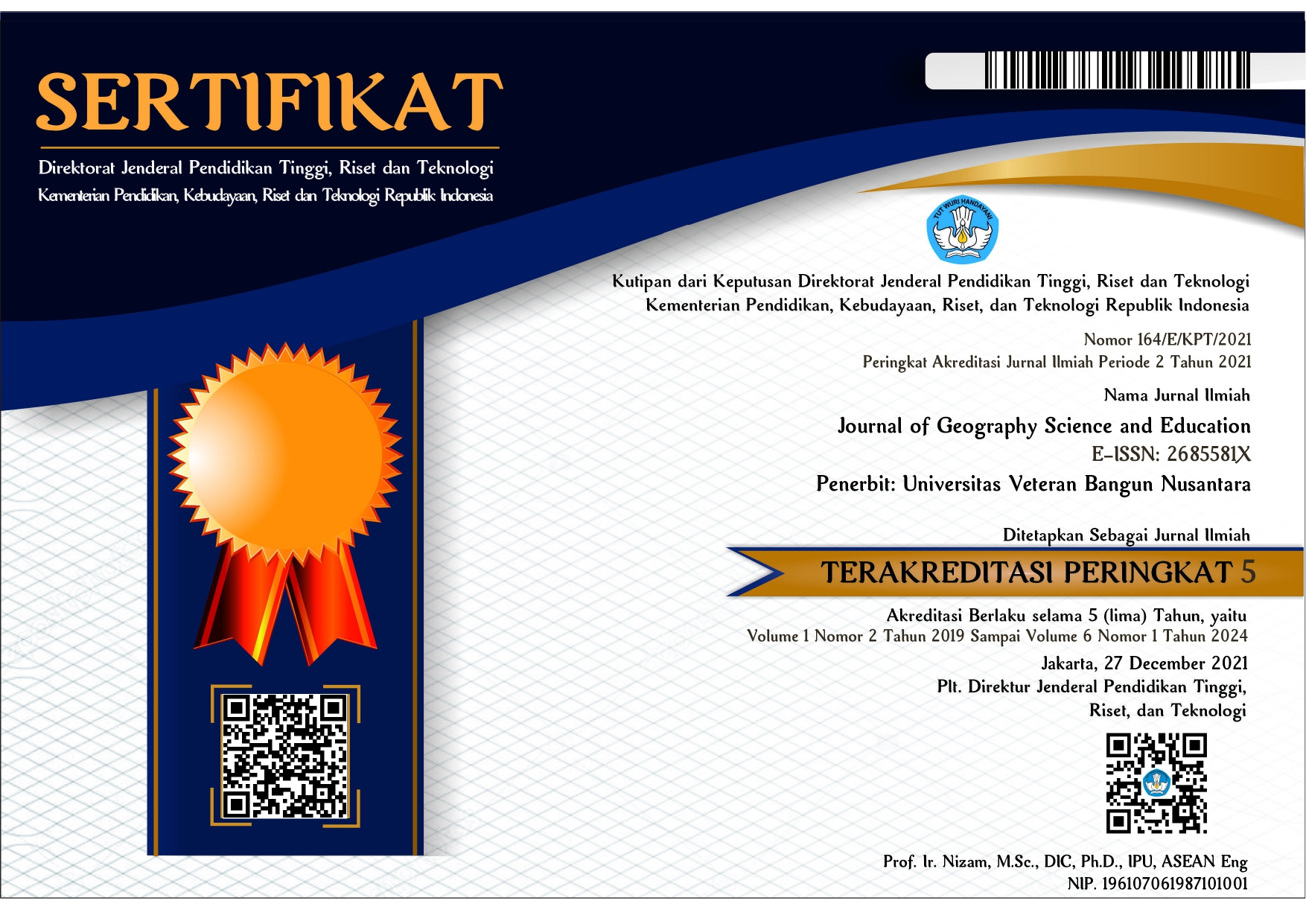ANALYSIS OF PUBLIC BEHAVIOR IN THE FACE OF THE CORONA VIRUS PANDEMIC (COVID-19) IN THE VILLAGE OF PALUR DISTRICT OF MOJOLABAN SUKOHARJO DISTRICT
DOI:
https://doi.org/10.32585/jgse.v2i2.1364Kata Kunci:
behavior, pandemic, covid-19, impactAbstrak
The study aims to learn: (1) the behavior of palur village people in the face of the pandemic. (2) government policy understanding of social distension. (3) the impact of a pandemic in palur village of mojolaban district sukoharjo district district district.The methods used in this study are qualitative disticized, depicting or enhancing and learning about people's behavior in dealing with the corona virus pandemic (covid-19) in palur village, government policies on social distension and knowing the effects of the corona virus (covid-19) in palur village. The data-gathering technique used is through direct field observations, interviews and documenting. The data analysis techniques used are descriptive data analysis and chart data.The results of the study are: (1) citizens are more accustomed to clean and healthy living, implementing health protocols in accordance with government requirements. (2) palur villagers are aware of the social censorship and prevention efforts in dealing with pandemics in accordance with government appeals, but there are still a few places where crowds are. (3) the impact of inequality on people is social, economic and health.
Unduhan
Referensi
Badan Pusat Statistik Kabupaten Sukoharjo. 2019. Kecamatan Mojolaban Dalam Angka 2019
Dana Riksa Buana. 2020. Analisis Perilaku Masyarakat Indonesia dalam Menghadapi Pandemi Virus Corona (Covid-19) dan Kiat Menjaga Kesejahteraan Jiwa. Jurnal Sosial & Budaya Syar-i FSH UIN Syarif Hidayatullah Jakarta. 7 (3): 217-226.
Data Monografi Desa Palur Kecamatan Mojolaban Kabupaten Sukoharjo Tahun 2020 Semester I
Wahyu, Ramdani. 2017. Ilmu Sosial Dasar. Bandung:Pustaka Setia
Umanailo ,M. Chairul Basrun. 2016. Ilmu Sosial Budaya Dasar. Namlea: Fam Publishing
Moleong, Lexy. J. 2017. Metode Penelitian Kualitatif. Bandung: Rosda Karya
Yunus, Nur Rohim, and Rezki, Annissa. 2020. Kebijakan Pemberitahuan Lockdown Sebagai Antisipasi Penyebaran Corona Virus Covid-19. Jurnal Sosial & Budaya Syar-i FSH UIN Syarif Hidayatullah Jakarta. 7 (3): 227-238.
Sohrabi, C., et al (2020). World Health Organization declares global emergency: A review of the 2019 novel coronavirus (COVID-19). International journal of surgery, 76, 71-76.
Sugiyono, 2017. Metode Penelitian Kuantitatif, Kualitatif dan R&D. Bandung: Penerbit Alfabet
Syandri, Fadhlan Akbar. 2020. Penggunaan Masker Penutup Wajah Saat Salat Sebagai Langkah Pencegahan Wabah Coronavirus Covid-19. Jurnal Sosial & Budaya Syar-i FSH UIN Syarif Hidayatullah Jakarta. 7 (3): 261-268.
Unduhan
Diterbitkan
Cara Mengutip
Terbitan
Bagian
Lisensi
License and Copyright Agreement
In submitting the manuscript to the journal, the authors certify that:
- They are authorized by their co-authors to enter into these arrangements.
- The work described has not been formally published before, except in the form of an abstract or as part of a published lecture, review, thesis, or overlay journal. Please also carefully read JGSE's Posting Your Article Policy at http://pubs2.ascee.org/index.php/ijele/about/editorialPolicies#custom-5
- That it is not under consideration for publication elsewhere,
- That its publication has been approved by all the author(s) and by the responsible authorities – tacitly or explicitly – of the institutes where the work has been carried out.
- They secure the right to reproduce any material that has already been published or copyrighted elsewhere.
- They agree to the following license and copyright agreement.
Copyright
Authors who publish with Journal of Geography Science and Education agree to the following terms:
- Authors retain copyright and grant the journal right of first publication with the work simultaneously licensed under a Creative Commons Attribution License (CC BY-SA 4.0) that allows others to share the work with an acknowledgment of the work's authorship and initial publication in this journal.
- Authors are able to enter into separate, additional contractual arrangements for the non-exclusive distribution of the journal's published version of the work (e.g., post it to an institutional repository or publish it in a book), with an acknowledgment of its initial publication in this journal.
- Authors are permitted and encouraged to post their work online (e.g., in institutional repositories or on their website) prior to and during the submission process, as it can lead to productive exchanges, as well as earlier and greater citation of published work.
Licensing for Data Publication
Journal of Geography Science and Education use a variety of waivers and licenses, that are specifically designed for and appropriate for the treatment of data:
- Open Data Commons Attribution License, http://www.opendatacommons.org/licenses/by/1.0/ (default)
- Creative Commons CC-Zero Waiver, http://creativecommons.org/publicdomain/zero/1.0/
- Open Data Commons Public Domain Dedication and Licence, http://www.opendatacommons.org/licenses/pddl/1-0/
Other data publishing licenses may be allowed as exceptions (subject to approval by the editor on a case-by-case basis) and should be justified with a written statement from the author, which will be published with the article.
Open Data and Software Publishing and Sharing
The journal strives to maximize the replicability of the research published in it. Authors are thus required to share all data, code or protocols underlying the research reported in their articles. Exceptions are permitted but have to be justified in a written public statement accompanying the article.
The associated persistent identifiers (e.g. DOI, or others) of the dataset(s) must be included in the data or software resources section of the article. Reference(s) to datasets and software should also be included in the reference list of the article with DOIs (where available). Where no domain-specific data repository exists, authors should deposit their datasets in a general repository such as ZENODO, Dryad, Dataverse, or others.
Small data may also be published as data files or packages supplementary to a research article, however, the authors should prefer in all cases a deposition in data repositories.






